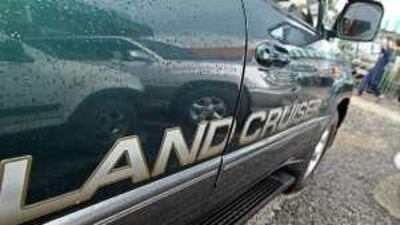NAIROBI // When Kenya's finance minister was putting together the government's budget back in June, he came up with a novel idea to save money, but one that has clashed with his colleagues' taste for a lavish lifestyle.
All the ministers and assistant ministers were told to hand in their government-issued, fuel-guzzling Toyota Land Cruisers and Mercedes. In return, they were to be given more fuel-efficient, smaller and cheaper Volkswagen Passats. The pricier cars were to be sold at auction to inject some much-needed hard currency into Kenya's economy that has been hit hard by the global recession. "A Mercedes is a Mercedes and it is expensive," said Joseph Kinyua, the permanent secretary to the finance ministry. "As a government, that is not the kind of image we want to pass on to Kenyans."
As the deadline to turn in their cars passed over the weekend, however, only seven of the 40 cabinet ministers had complied. About 90 cars belonging to ministers, assistant ministers and permanent secretaries were still outstanding. Uhuru Kenyatta, the finance minister, himself drives a Passat, which meets the requirement that all government-issued cars have engine sizes smaller than 2,000cc. That would rule out the large Mercedes that officials in Kenya have become accustomed to.
There is even a word in Swahili for Mercedes-driving big men. "Wabenzi", or Benz people, could also be used to describe the culture of Kenyan government largesse to its own in a country where the average citizen struggles to earn a living. In a 2006 report, Transparency International, a corruption watchdog, said the Kenyan government had spent US$12 million (Dh44m) on luxury cars in two years, including $5.2m to buy 57 Mercedes. "Kenya is truly the original home of the Wabenzi," the report said. "The E-class appears to be a particularly popular trophy/status symbol."
Some ministers have refused to hand in their four-wheel-drive vehicles, saying they need the rugged cars to visit projects in rural areas where roads are poor. "This is not going to be practical," Soita Shitanda, the housing minister, told reporters. "We cannot drive in the same cars as teenagers. The [finance] minister must have been duped by his advisers." Once the vehicles have been turned in, the government plans to sell them and use some of the proceeds to help resettle people still displaced from post-election rioting at the beginning of last year.
Kenya's coalition government has formed a task force to manage the handover of the vehicles. The government owns about 8,900 vehicles, including the luxury cars, according to a government report. "Since the grand coalition government was formed transport expenditure has shot up" to over $53m, said Donald Kibera, who heads the task force. "This is going to come down and funds spread to needy services such as drought, famine, health and education."
Kenyans, however, are sceptical that their politicians will be able to kick the luxury-car habit and hand over their vehicles. "Politicians like to be seen as having money and power," said Martin Wangeru, a politics professor at the University of Nairobi. "They think people will respect them more in a flashy car. That respect translates into votes." Some see fancy government cars as another example of the corruption that is stifling development in Kenya. The country's politicians are among the highest paid in the world, with ministers earning $15,000 per month.
"If a politician is willing to give up his car, it would show that he is more like the people, more willing to fight corruption," said Peter Kamau, a mechanic in Nairobi. "But I don't see them rushing to give up their cars." There are some, however, who support the ministers' right to drive in luxury. Lucy Oriang, a columnist for the influential newspaper Daily Nation, wrote in an article that politicians should be entitled to better transport than the average Kenyan so that they can be seen to have a higher status than voters.
"The new move is dangerous," she wrote. "It will tarnish the very idea of the leader as a breed apart from the rest. Even in the old days, you could tell the difference between the chief and the rest by the number of wives and children and huts in his homestead." @Email:mbrown@thenational.ae

